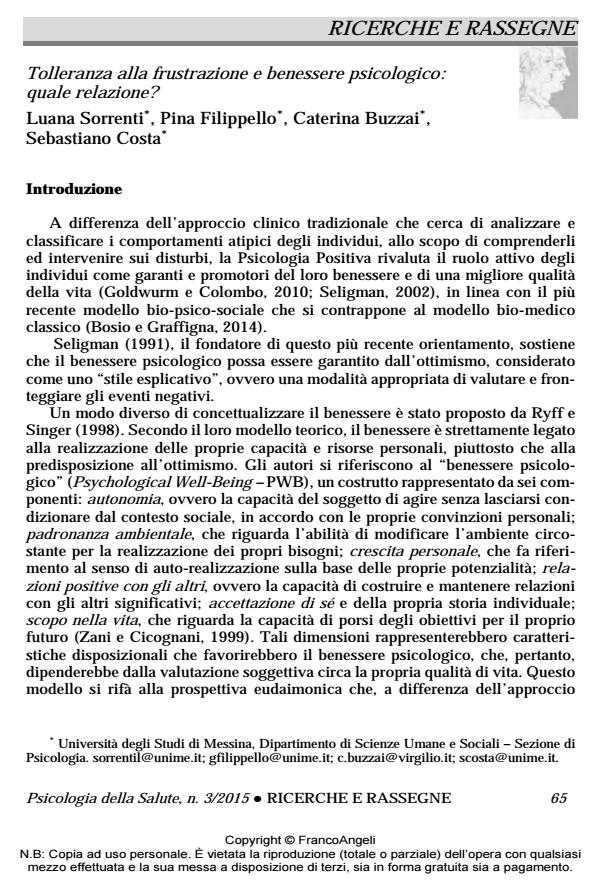Tolleranza alla frustrazione e benessere psicologico: quale relazione?
Titolo Rivista PSICOLOGIA DELLA SALUTE
Autori/Curatori Luana Sorrenti, Pina Filippello, Caterina Buzzai, Sebastiano Costa
Anno di pubblicazione 2015 Fascicolo 2015/3
Lingua Italiano Numero pagine 22 P. 65-86 Dimensione file 178 KB
DOI 10.3280/PDS2015-003004
Il DOI è il codice a barre della proprietà intellettuale: per saperne di più
clicca qui
Qui sotto puoi vedere in anteprima la prima pagina di questo articolo.
Se questo articolo ti interessa, lo puoi acquistare (e scaricare in formato pdf) seguendo le facili indicazioni per acquistare il download credit. Acquista Download Credits per scaricare questo Articolo in formato PDF

FrancoAngeli è membro della Publishers International Linking Association, Inc (PILA), associazione indipendente e non profit per facilitare (attraverso i servizi tecnologici implementati da CrossRef.org) l’accesso degli studiosi ai contenuti digitali nelle pubblicazioni professionali e scientifiche.
L’obiettivo del presente studio è quello di analizzare la relazione tra le dimensioni del benessere psicologico e le credenze di intolleranza alla frustrazione. Si è ipotizzato che a più alti livelli di intolleranza alla frustrazione (intolleranza emotiva, intolleranza al disagio, pretese/diritto, perfezionismo/realizzazione) corrisponda un minor indice di benessere psicologico e delle dimensioni che lo compongono. Sono state, inoltre, indagate eventuali differenze di genere e la possibile relazione con l’età delle variabili considerate, allo scopo di ampliare le conoscenze scientifiche in un campo di indagine dai risultati ancora poco uniformi. Hanno partecipato alla ricerca 200 studenti universitari campionati negli Atenei della città di Messina e di Reggio Calabria. Per la valutazione delle variabili considerate sono state utilizzate le versioni italiane del Psychological Well-being Scale (PWB) di Ryff (Ryff, 1989; Ruini et al., 2003) e del Frustration Discomfort Scale (FDS) di Harrington (Harrington, 2005a; Filippello et al., 2014). I risultati hanno in parte confermato le ipotesi di partenza. Relativamente alle differenze di genere, le donne presentano sia un minor benessere sia una maggiore intolleranza alla frustrazione, rispetto agli uomini. Per quanto concerne l’età, si evince una correlazione negativa con le credenze di intolleranza emotiva, pretese/diritto e intolleranza al disagio. Infine, l’analisi di regressione ha messo in evidenza che alcune dimensioni dell’intolleranza alla frustrazione (intolleranza emotiva e intolleranza al disagio) sono negativamente predittrici del benessere psicologico; mentre, le credenze perfezionistiche (perfezionismo/realizzazione) lo influenzano positivamente. Ulteriori studi longitudinali sarebbero opportuni al fine di approfondire e confermare in maniera adeguata i risultati ottenuti.
Parole chiave:Benessere psicologico, intolleranza alla frustrazione, psicologia positiva, differenze di genere, differenze di età
- Learned helplessness and mastery orientation: The contribution of personality traits and academic beliefs Luana Sorrenti, Pina Filippello, Caterina Buzzai, Chiara Buttò, Sebastiano Costa, in Nordic Psychology /2018 pp.71
DOI: 10.1080/19012276.2017.1339625 - The Relationship Between Contextual and Dispositional Variables, Well-Being and Hopelessness in School Context Caterina Buzzai, Luana Sorrenti, Susanna Orecchio, Davide Marino, Pina Filippello, in Frontiers in Psychology 533815/2020
DOI: 10.3389/fpsyg.2020.533815 - School Refusal and Absenteeism: Perception of Teacher Behaviors, Psychological Basic Needs, and Academic Achievement Pina Filippello, Caterina Buzzai, Sebastiano Costa, Luana Sorrenti, in Frontiers in Psychology 1471/2019
DOI: 10.3389/fpsyg.2019.01471 - Group cohesion, motor self-efficacy, and socio-emotional skills in physical education students in a region of Spain: a descriptive study María José García-Guillén, Antonio Castillo-Paredes, Carmen Galán-Arroyo, Jorge Rojo-Ramos, in Frontiers in Psychology 1631231/2025
DOI: 10.3389/fpsyg.2025.1631231
Luana Sorrenti, Pina Filippello, Caterina Buzzai, Sebastiano Costa, Tolleranza alla frustrazione e benessere psicologico: quale relazione? in "PSICOLOGIA DELLA SALUTE" 3/2015, pp 65-86, DOI: 10.3280/PDS2015-003004